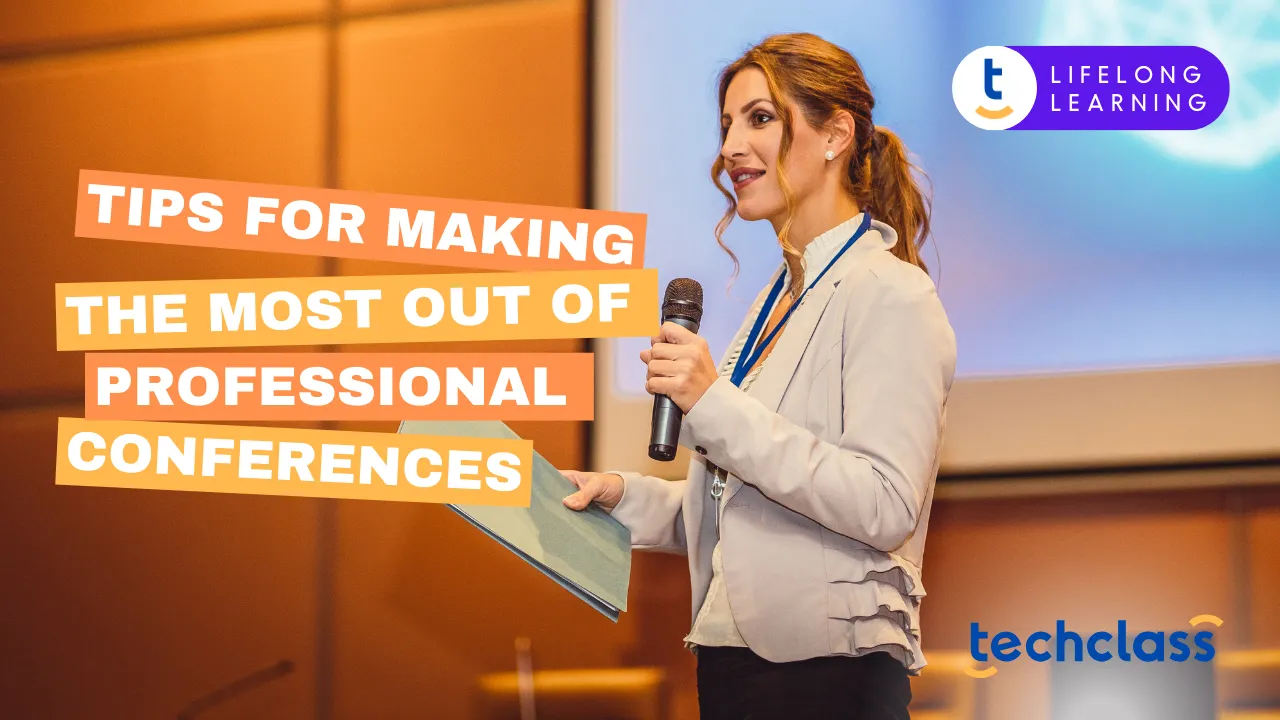
Conferences are powerful for your career. The ability to learn about trends, upskill, and meet new people in your industry could be a great step. Sometimes, that also means juggling the overwhelming number of speakers, sessions, contacts, and conversations. If you're strategic with your plan of attack before the conference, you'll be able to make the most out of any opportunities that come your way. Whether it is planning ahead or ensuring that you have a good time at the conference, here is what you need to know to get the most out of your next conference.
While attending a conference is often valuable on its own, an active role can make it much more so. Consider presenting your work, facilitating a session, or getting involved in a committee of volunteers whose names appear in the program. Watch for notices of these opportunities when the first mention of the conference is sent out, or contact the conference organizer directly to ask about them. Plunging right into a visible role would help you stand out and leave an impression, especially with potentially hundreds or even thousands of attendees.
The value of attending a conference often extends beyond the sessions to include networking with peers, reaching new prospects, and engaging with existing customers.
Make the most of this opportunity by first identifying who will be attending besides you. Virtually every conference has a Facebook event page and a Twitter hashtag, through which participants and organizers update statuses with great regularity. Use these to follow people you already know and to target new people you would like to meet. Do not rely on chance encounters for connections; instead, reach out to potential contacts in advance of the conference to let them know you will be there. This way, you can proactively schedule meetings with others and have real, substantive discussions rather than trying to squeeze them into a break session that may last only 10 to 15 minutes.
Going through the agenda is one of the simplest but most important things to do before a conference. Establish what you want to learn or accomplish from the event, and using the agenda, create a plan customized to those objectives.
Be sure to attend conference-wide events such as keynote addresses. These sessions are typically intentionally scheduled not to compete with other activities, so you won't have to worry about missing out on concurrent breakout sessions.
Conferences are often multi-day events filled with long hours and numerous activities. To minimize stress and maximize your experience, ensure you’ve packed and prepared appropriately before you embark on your journey:
Conferences are packed with information from numerous speakers and sessions, making it challenging to remember everything when you get back home. To ensure you retain valuable insights, organize your notes in a way that makes them easy to access later.
Whether you prefer taking notes with pen and paper, on a laptop, tablet, or smartphone, make it a habit to jot down three key takeaways at the end of each session. Additionally, note any follow-up actions you want to take on the topic or with the speakers. This practice will help jog your memory and provide you with specific tasks to tackle when you return to the office, ensuring that the knowledge gained at the conference translates into actionable steps.
Speakers and panelists at conferences are often leading experts in your field, making them valuable connections. Don’t hesitate to ask questions during sessions or to linger afterward to introduce yourself, express your appreciation for their presentation, and exchange business cards.
If you don’t get a chance to ask your question in person, you can always follow up on social media. X, in particular, is a great platform for this, as many speakers are active and responsive there. Engaging with these experts not only helps you gain deeper insights but also expands your professional network.
You have successfully booked meetings with your prospects; now is the time to leverage those opportunities. Use these meetings to listen to their concerns and anxieties, and show them how you are able to solve their problems and boost their businesses.
After all, these meetings are not to be considered primarily deal-closing moments. Like you, they are at the conference to acquire knowledge and become experts. Instead, use these conversations to set the stage for future, more targeted discussions that address specific pain points or questions. Conclude each meeting with a summary of key takeaways and let your prospects know you'll be following up with relevant materials. This builds the foundation for ongoing, productive conversations that can lead to a successful business relationship.
Conferences offer a significant burst of inspiration, but the true value lies in how you integrate those insights into your daily workflow. Without a centralized system to capture and share what you have learned, the most impactful takeaways often fade once you return to the office. Manually distributing notes and following up on new skills can quickly become an administrative burden that stifles the momentum gained during the event.
TechClass helps you transform individual experiences into organizational knowledge. By using the platform's social learning features and AI Content Builder, you can easily turn session notes or speaker materials into structured Learning Paths for your entire team. This ensures that the professional development started at an event becomes a continuous part of your company culture. Whether you are scaling networking skills or technical expertise, TechClass provides the infrastructure to make lifelong learning a measurable and sustainable reality for every employee.


